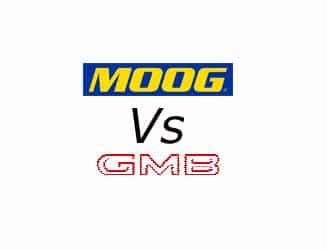Moog vs. GMB: Which Universal Joint Is Better for Compact Cars?
Table of Contents
Moog vs. GMB: Which Universal Joint Is Better for Compact Cars?
When it comes to replacing the universal joints in your compact car, two major players stand out: Moog and GMB. But which brand offers better performance, durability, and value for compact car owners? This guide dives into the features, differences, and key benefits of each to help you make an informed decision.
What Are Universal Joints and Why Are They Important?
Universal joints, often called U-joints, are critical for the drivetrain of your vehicle. They allow for the transfer of power from the transmission to the differential, accommodating the movement of the driveshaft. If your car’s U-joint starts to wear out, you’ll notice symptoms like vibrations, clunking sounds, or even difficulty steering—signs you shouldn’t ignore.
Moog Universal Joints for Compact Cars
Moog has a strong reputation for producing high-quality, long-lasting parts, including universal joints. Known for their advanced designs and consistent performance, Moog U-joints often feature:
- Durability: Moog uses high-strength alloy steel to withstand heavy loads and ensure a long lifespan.
- Greaseable Design: Many Moog U-joints come with a grease fitting, allowing for easy maintenance and extended service life.
- Quality Warranty: Moog stands by their products with a limited lifetime warranty, providing peace of mind.
GMB Universal Joints for Compact Cars
GMB, a well-known brand in the aftermarket auto parts industry, offers universal joints that combine affordability and reliability. Highlights of GMB U-joints include:
- Precision Engineering: GMB parts are engineered to strict OE standards, ensuring a perfect fit for compact car models.
- Pre-Greased & Sealed: Many GMB U-joints are pre-greased and sealed for a maintenance-free experience, ideal for drivers who prefer a hassle-free solution.
- Warranty Coverage: GMB provides a one-year warranty, which, while not as extensive as Moog’s, reflects their confidence in product quality.
Head-to-Head Comparison: Moog vs. GMB
When comparing these two brands, it’s essential to consider various factors, from material quality to cost and warranty. Here’s a breakdown:
| Feature | Moog | GMB |
|---|---|---|
| Material Quality | High-strength alloy steel | OE-quality steel |
| Greaseable | Yes, for extended life | No, sealed and pre-greased |
| Warranty | Limited lifetime warranty | One-year warranty |
| Fitment | Consistent OE fit for most compact models | Precision fit engineered to OE standards |
| Common Models | Universal Joint Kit (e.g., Moog 280) | Universal Joint Kit (e.g., GMB 210-0143) |
| Price Range | Higher due to premium features | More affordable, good value for money |
Note: Click on the part numbers to purchase these from TwinSpringCoupling.com for competitive pricing and reliable delivery.
Most Common Moog and GMB Universal Joints for Compact Cars
Here’s a handy table listing the most popular U-joints from both brands, designed for compact car applications:
| Brand | Part Number | Compatible Vehicles | Link |
|---|---|---|---|
| Moog | 280 | Honda Civic, Toyota Corolla | Moog 280 |
| Moog | 231 | Mazda 3, Hyundai Elantra | Moog 231 |
| GMB | 210-0143 | Ford Focus, Nissan Sentra | GMB 210-0143 |
| GMB | 210-0136 | Volkswagen Golf, Kia Forte | GMB 210-0297 |
What to Consider When Choosing Your Universal Joint
- Driving Habits: If you regularly drive in harsh conditions or tow heavy loads, you might benefit from Moog’s heavy-duty options.
- Budget: GMB provides a cost-effective alternative, ideal for standard driving and routine use.
- Maintenance Preferences: Moog’s greaseable joints require occasional maintenance, while GMB’s sealed units are maintenance-free.
Warranty Details
- Moog: Limited lifetime warranty, covering defects in material and workmanship.
- GMB: One-year warranty, which is still a solid offer but doesn’t match the extended coverage of Moog.
Frequently Asked Questions
1. How do I know if my universal joint needs to be replaced?
Look for common warning signs like:
- Vibrations: You may feel vibrations coming from underneath the vehicle, especially when accelerating.
- Clunking Noises: A worn U-joint can cause loud clunking or banging sounds, particularly when shifting gears or when the transmission engages.
- Steering Issues: If you notice difficulty steering or if the vehicle feels unstable, it may be time to inspect the U-joints.
- Grease Leakage: Visible signs of grease around the U-joint could indicate wear and the need for a replacement.
2. Is it better to choose a greaseable U-joint or a sealed one?
It depends on your maintenance habits:
- Greaseable U-joints (like Moog): These require regular greasing, which can extend the lifespan of the joint and provide better performance in harsh conditions. They’re ideal for high-stress applications or off-road use.
- Sealed U-joints (like GMB): These are pre-lubricated and maintenance-free, making them convenient for drivers who prefer low maintenance. However, they might have a slightly shorter lifespan compared to greaseable options.
3. Are Moog U-joints worth the higher price?
Absolutely, especially if durability and longevity are top priorities. Moog U-joints are engineered with high-quality materials and a greaseable design for better performance under heavy loads. However, if your driving conditions are moderate and you’re on a budget, GMB offers a great balance between performance and affordability.
4. How long does a typical universal joint last?
The lifespan of a U-joint can vary based on driving conditions and maintenance. On average, a U-joint can last between 100,000 and 150,000 miles, but factors like off-road driving, towing, or a lack of maintenance can shorten that lifespan.
5. Can I replace a universal joint myself, or should I seek professional help?
Replacing a U-joint can be challenging and requires specific tools and mechanical knowledge. If you’re experienced with car repairs and have the right equipment, you can attempt it yourself. However, if you’re not confident, it’s best to consult a professional mechanic to ensure proper installation and safety.
6. What causes universal joints to fail?
Common causes of U-joint failure include:
- Lack of Lubrication: U-joints need proper lubrication to function. Without regular greasing (in the case of greaseable U-joints), they can wear out faster.
- Corrosion: Water and road salt can corrode metal components, leading to premature failure.
- Overloading: Subjecting your vehicle to excessive loads can put extra strain on the drivetrain and accelerate U-joint wear.
7. How do I choose the right universal joint for my compact car?
Check your vehicle’s manual or consult a professional to ensure the U-joint you choose matches your car’s specifications. Brands like Moog and GMB have compatibility charts that can help you select the right part for your vehicle model.
8. What happens if I ignore a worn-out universal joint?
Ignoring a failing U-joint can lead to serious problems:
- Drivetrain Damage: If a U-joint fails completely, it can cause the driveshaft to detach from the vehicle, resulting in extensive and costly repairs.
- Loss of Control: A broken U-joint can cause your car to become unstable and even lead to accidents.
- Additional Repairs: The longer you wait, the more likely it is that the failing U-joint will damage other components, like the driveshaft or differential.
Moog vs. GMB: Which Universal Joint Is Better for Compact Cars?
Final Verdict: Moog or GMB?
Ultimately, the best choice depends on your needs and preferences. Moog is ideal for those looking for top-tier durability and performance, while GMB offers excellent value and ease of use.
Ready to upgrade your universal joint? Click the links above to buy from TwinSpringCoupling.com and get the best deals today!

